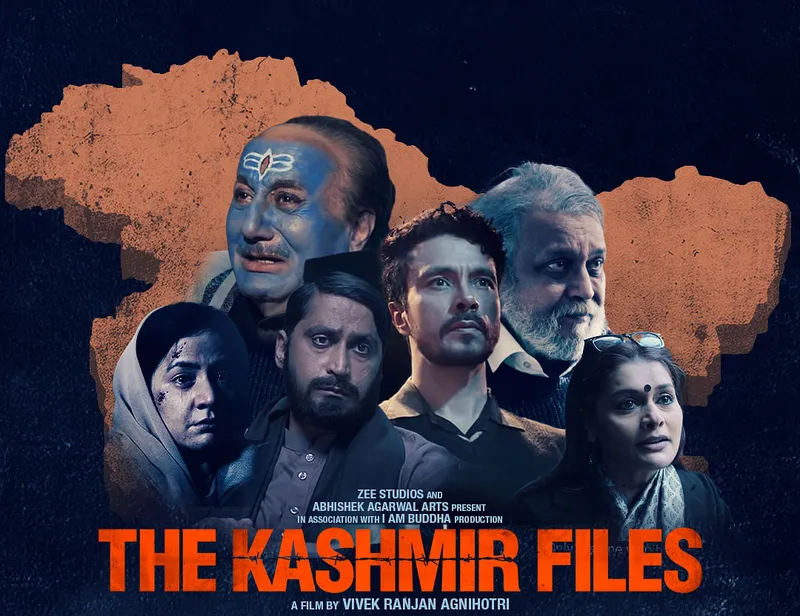Propaganda over storytelling: The Vaccine War adds to a growing trend in cinema
Based on the book ‘Going Viral’ by former Indian Council of Medical Research (ICMR) Prof Balram Bhargava, The Vaccine War focuses on the work of government scientists and public servants.
Watching Vivek Agnihotri’s film, The Vaccine War makes one introspect on the interpretative nature of music and cinema. The film uses Vanraj Bhatia’s theme song, Srishti Se Pehle Kuch Nahi Tha, from the Doordarshan non-fiction series Bharat Ek Khoj.
In the film, the song underlines a ‘new India’ of sorts, where science has become core to the country's identity, hinting that the previous years were perhaps not so golden. Ironic, given that Bharat Ek Khoj adapts Pandit Jawaharlal Nehru’s book, Discovery of India—the first prime minister who is often a soft target for a hyper nationalist narrative that rules current political discourses.
The Vaccine War is not all about singing the government’s praises. Based on the book ‘Going Viral’ by former Indian Council of Medical Research (ICMR) Prof. Balram Bhargava, the film primarily focuses on the sacrifices and unsung capabilities of government scientists and public servants.

Source: IMDB
Without stating it directly, it also underlines a propensity to trust Western medical research and science amongst a section of India’s educated elite over homegrown medical developments. This is why, the word ‘Atmanirbhar’ emerges frequently in the film, like a buzzword for (imagined) magnificence.
Changing with the times
Films reflect the popular mindset of a people and a country. In the 70s, not unlike Hollywood, India saw the ‘Angry Young Man’ rise with Amitabh Bachchan. His characters reflected discontent and disillusionment with unemployment, a stagnant economy, and regional political tensions that dogged a young nation.
In the 90s, Hindi cinema saw the rise of the gentle-mannered, loving, and romantic hero–a reflection of the surge in earning and prestige of the Indian diaspora, and Indian employees in a gradually developing economy.
At present, as economies stagnate worldwide and the job market freezes out the aspirations of countless people, uncertainty is the dominant mood. Reiterating an ancient, rooted, and patriotic identity is both reassuring and easy to consume for the anxious Indian person (that is, most of us).
It doesn’t surprise that politically motivated films are growing in numbers and delivering sleekly produced narratives around the strengths of India.
One can almost be certain that the Chandrayaan 3 project must have quite a few filmmakers queuing up for story rights. But this movement–towards only positive and celebratory India-centric stories–is not healthy for the artistic legacy of a democratic nation.
For instance, we had The Kerala Story (2023). A drama about the forced conversion and enslavement of Indian Muslim brides by the terror outfit ISIS, a story that has found supporters. As state governments sparred over its release, with some backing the film wholeheartedly while others banning it, the film’s business and credibility were affected negatively. Its director Sudipto Sen cried foul when the film didn’t get a lucrative buyout by OTT platforms. A propaganda film can also carry elements of truth, provided it doesn’t get pulled into a bipartisan political discourse.
Some films benefit from bipartisan politics. For instance, The Kashmir Files (2022), also by Agnihotri, went on to become a hit across India. Some state governments–like Assam–actively endorsed it, compelling every government employee to watch this film in theatres. The political support worked well in building interest and making it successful, as did solid performances by Pallavi Joshi and Anupam Kher.

Source: IMDB
Agnihotri has been smart while making pro-government and pro nationalist films. He makes them taut and drums up human drama in them, thereby making these characters easy to relate with.
In search of truth
The Vaccine War presents Nana Patekar as a relentless Balram Bhargava, not erudite but determined to provide a vaccine. It highlights sacrifices made by the teams developing this vaccine, especially the women involved in making it. But it has no mention of the companies that manufactured vaccines, including the makers of Covaxin, Bharat Biotech. Emphasis is on showing India’s brilliance and resilience.
Backed by talented performers, one does begin to believe in some of it while watching it. Agnihotri has also criticised political rallies and the Kumbh Mela through dialogues, lightly balancing the overtly nationalist message in the film.
While most of India’s achievements around building a vaccine are factual, the ideas of inclusiveness and tolerance–a huge part of our identity–are lost in the movie's hyper-patriotic discourse.
The lucrative business that such patriotic films bring spawns opportunistic filmmaking. For instance, the upcoming Mission Raniganj- The Great Bharat Rescue, features Akshay Kumar, the new age Manoj Kumar, as a one man messianic hero and brave heart that rescued miners in an accident. A rescue operation must be devoid of national or regional identities for it’s a man-made disaster that puts human beings at risk. Dressing up a film with some patriotic trimmings gives it a bigger chance at the box office.
Although the sullen-faced Salman Khan as Tiger in the intelligent Tiger 3 ‘message’ trailer is just the kind of patriot that naturally connects with Gen Z and millennial audiences, the same applies to the spunky saviour Shah Rukh Khan of Pathaan and Jawan. These films aren’t examples of artistic storytelling or fine cinematic writing and they bank on the massive popularity of their stars. However, they entertain while reinforcing the greatness of India as a nation.
In the world of entertainment, that always works better.
Edited by Affirunisa Kankudti







